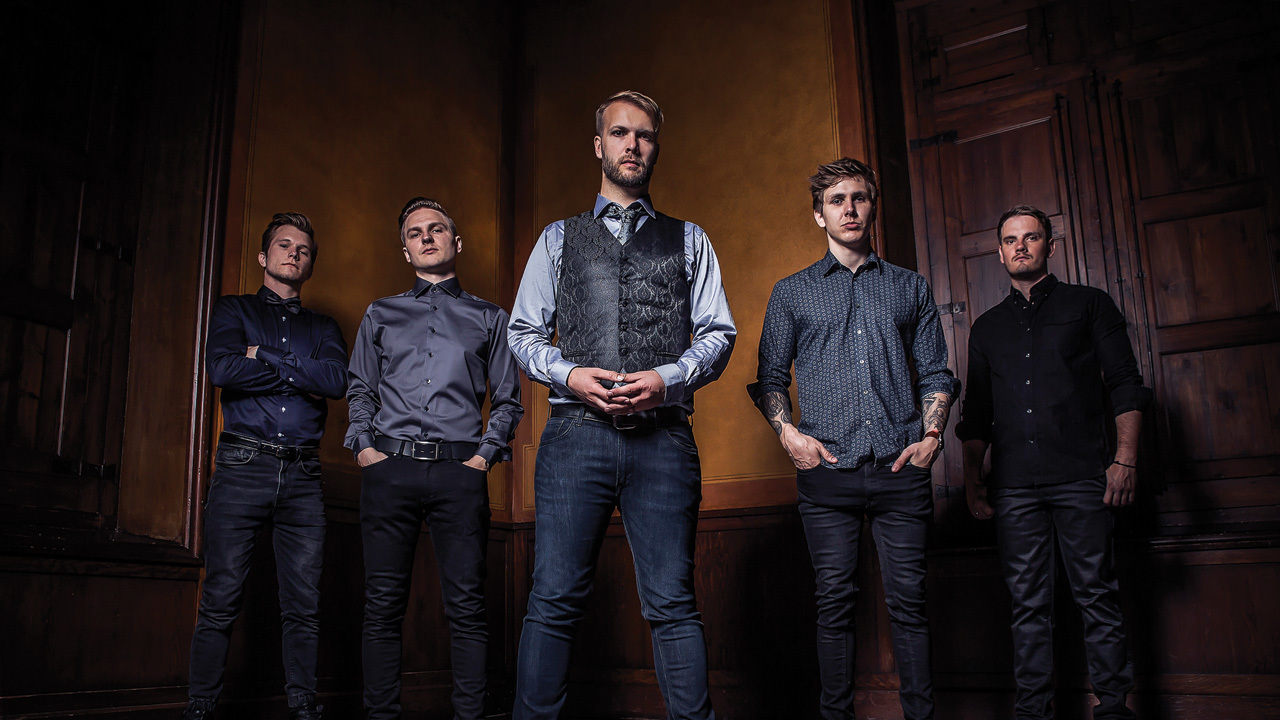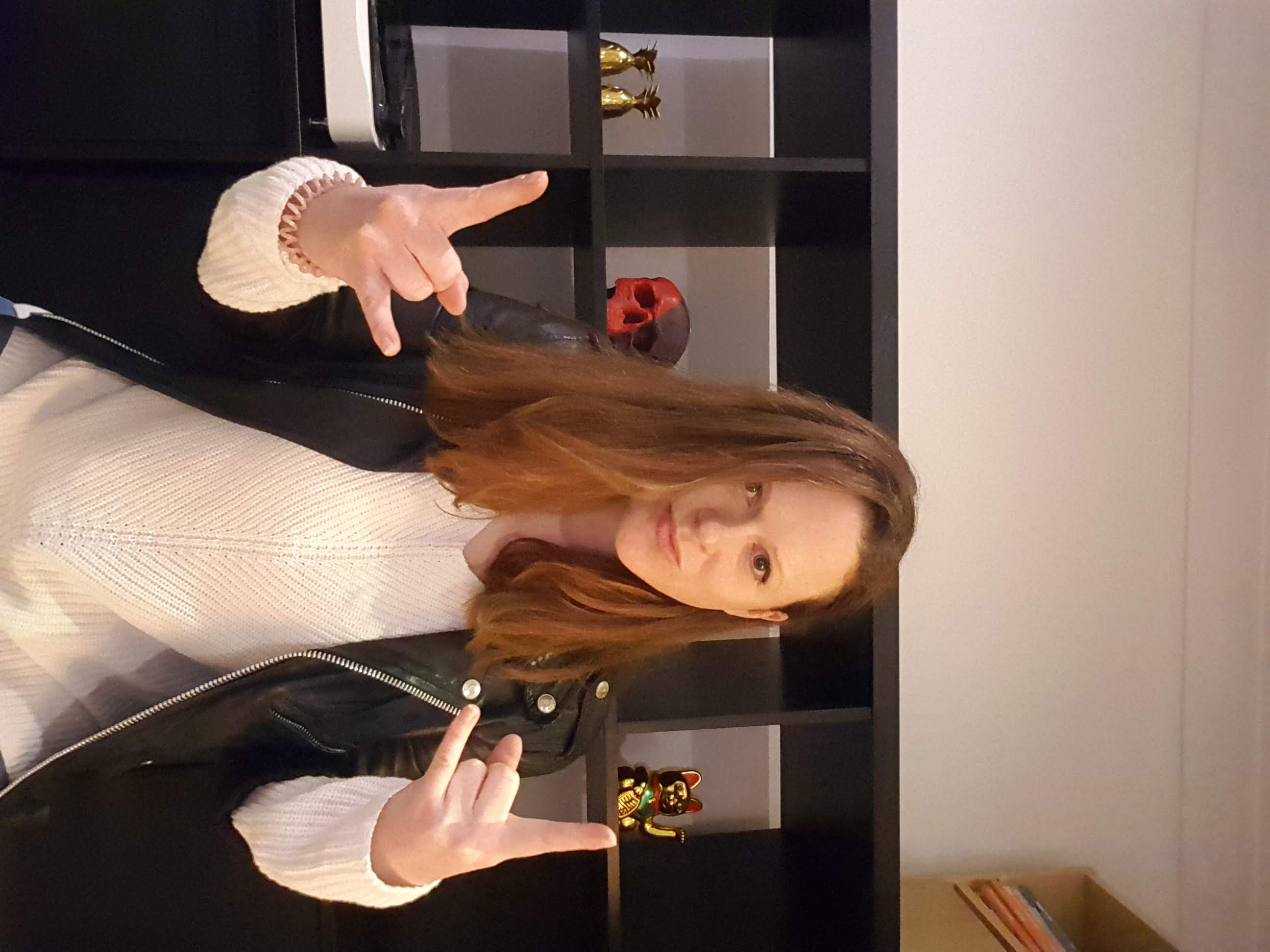It could be so easy to assume that Leprous belong to the darkest corner of heavy metal. For starters, their name has all the associations of a band that distil their very being into a sonic sledgehammer of blood, guts and gore.
“It has almost become a curse for us, that name,” laughs the band’s lead singer and keyboardist Einar Solberg, who is more relaxed and chatty than his wired, reticent stage persona suggests. “And, of course, we played with Ihsahn.”
As the brother-in-law of the multi-talented baron of black metal, Solberg’s connections with Ihsahn run deep. The nihilistic prog of Ihsahn’s solo work might be familiar to Prog readers, but it’s his history with black metal torchbearers Emperor – whose band members included those incarcerated for church burning and arson – that has caused indirect associations to be made between Leprous and the black metal inner circle. And this is why ‘Ihsahn’s backing band’ is a subtext which has compounded the illusion that Leprous are Satan’s biggest fans.
And yet their newest album Malina is their closest dalliance with prog rock yet, having more in common with Marillion than the ritualistic rebellion against Christian ideologies.
The truth is, Leprous were heavy once: a very long time ago when they played as teenagers and wore corpse paint on stage. But by the time they had released their first album, 2009’s Tall Poppy Syndrome, they had become a certified prog band with not a smear of blood in sight.
“A band can be one thing for so many years,” notes Solberg, “and then change into something completely different. I think that’s kind of cool. It’s better than creating new projects all the time.”

But if there’s one element of extreme metal that Leprous have carried with them through all these years it’s the notion to surprise, delight and sometimes shock with the posturing of their sound, aiming for something that goes further than skin deep.
“We’ve always done big, grandiose songs,” Solberg chuckles. “We’ve always been a bit over-the-top and that’s just who we are. We’ve never been minimalist in our approach in any sense – we’ve always been more focused on atmosphere than being prog with a big ‘p’.”
A willingness to embrace sonic peaks and huge, emotive choruses, set against a backdrop of rhythmic complexity and atmosphere-creating keys with splashes of metallic zeal, has given Leprous a distinctive sound, also thanks in part to Solberg’s impressive pipes. Earlier this year they found themselves playing with TesseracT and the Devin Townsend Project on a special tour where Townsend played Ocean Machine in full. It was no mean feat for Leprous to open for two of the most lauded acts in modern day prog, with arguably the best singers. But with an exceptional set focusing on the more epic outtakes from Leprous’ back catalogue, Solberg and co blew the audience away, earning a standing ovation and more than a few teary eyes.
“We know which are the best live songs and the ones which belong together in a setlist,” he states. “It’s very important to know how to build a setlist; it’s not just about taking the most popular songs or the best songs, it’s about the flow of the whole setlist.”
That’s one of the great things about Leprous – or, you could say, prog in general: the luxury of being able to delve into a diverse platter of material and pick out the most appropriate morsels depending on the mood. At this gig, the mood was epic and by default Leprous’ more recent albums served that purpose perfectly. But it isn’t always the case. This summer, they played a by-request set at Be Prog! My Friend festival in Barcelona and dusted off classic tracks for the old school brigade.
“It worked great in that context but what I’ve realised with fans is that, on the internet, it seems like the old material is king,” Solberg observes, having cast a keen eye over the Facebook and YouTube comments. “While in reality, at the live shows, you see that it’s absolutely not the case – the newer the songs are, the better reception they get. At Be Prog! we got to play everything from the first official album to the new single and without doubt the best reception was the new single – without any comparison – and that was very cool to see.”
Solberg is talking about From The Flame, the first track issued from Malina and the closest they’ve come to having a hit. Part new romantic, part juddering 13⁄8 beats and with one of the catchiest choruses they’ve ever written, it encapsulates the brighter chapter of their avant-garde. When it was first posted online, reactions were enthusiastic, but some fans have lambasted them as sell-outs, criticising Malina for not being heavy enough for their tastes.
However, as one astute cyber-surfer comments, if they stuck to the same thing all the time, they wouldn’t be a progressive band.
“It’s not how it works with our music – we don’t think about what we did before, we just write. I don’t say, ‘We need this kind of song now…’ I just write. And when we have all the material, we eliminate the majority of it and we steer it in a direction we like,” says Solberg. “We’ve never been focused on how people think we should sound, we’re just focused on how we feel at that moment.”
Malina’s artwork – a moody depiction of a Krypton-like landscape pierced by icy shards and bathed in a warm glow of light – is a step away from the deathly monochrome images of their last two albums, The Congregation and Coal. The human figure that is barely visible in the centre of this looming vista hints at an existential quest for meaning. Or maybe not. “Malina just means raspberries,” states Solberg.
But then maybe there is something in that insignificant figure that graces their album cover. “The main quality of any band is identity,” he muses.
Do Leprous have an identity?
“We’re constantly searching for it, which is why we’re always changing on every record.”
- Watch Leprous in fast-paced video for new track Illuminate
- Leprous – Live At Rockefeller Music Hall album review
- The TeamRock+ Singles Club
- TeamRock Radio app back on Apple’s app store
He continues after a pause. “We’ll probably be searching for it our entire career.”
Ironically, by persistently switching their sound, Leprous have identified themselves among the new wave of prog metal alumni that includes TesseracT, Devin Townsend, Haken, Between The Buried And Me and Persefone, with fans often typing about these bands in the same sentence on online forums, almost as though they’d discovered a water spring in a desert. And while Leprous continue to evolve, the appetite for shape-shifting music with an edge is also growing, earning them a burgeoning legion of fans.
“For some people, the most daring thing you can do as a prog band is to release a straightforward song,” says Solberg, referring to the reactions to From The Flame.
But remember that this is ‘straightforward’ in the world of Leprous. In reality, Malina is anything but simplistic. From the opening slow build of Bonneville, a track that cascades from the delicate rainfall-effect of overlapping percussion through a nihilistic bassline and into a gorgeous crescendo of pain-stricken vocals, the record recalls everyone from Marillion and Karnivool to Queen and Steven Wilson. It ends with The Last Milestone, a song that could have been written by Samuel Barber for a chamber choir and features the forlorn stringwork of cellist Raphael Weinroth-Browne.
Solberg recalls the time they chanced upon the talented musician: “We were playing in Ottawa and I was kind of tour managing at the same time. I went to tell the local support that they needed to stop playing soon because they were behind schedule but I just stopped and saw this one guy with a cello on stage. I forgot all about my plan to tell him to finish and I just stood there watching the whole set. It was really, really mind-blowing.”
As well as exploring new avenues with their sound, Leprous have also taken a left turn with the line-up after losing two members in the last couple of years. First, there was guitarist Øystein Landsverk, a long-standing member who had played with the band since 2004 and Solberg describes as a “true friend, comedian, computer geek and generally a spreader of good atmosphere”. Then bassist Martin Skrebergene departed during the recording of The Congregation.
The latter left Leprous in turmoil, frantically searching for a fill-in whom they eventually found in Simen Børven, while six-stringer Robin Ognedal has picked up from where Landsverk left.
Has the line-up change influenced the lighter sound of the record?
“Robin is a pretty different guitarist and that’s definitely set a different vibe on some of the songs,” Solberg openly states.
Despite any disruptions to the status quo, Leprous have put out another album like clockwork but you’ll have to wait until October, when they will undertake a gruelling European tour, to hear it live.
“It’s going to be a health camp of the strictest kind until we go on that tour… and during the tour actually,” Solberg chuckles.
But rest assured, there will be no prima donna antics if Solberg does catch the lurgy.” I learned how to sing with a really sore throat. During the last UK tour I had really bad flu and lost my voice. I had to stand in the shower for 30 minutes to loosen my vocal chords and then take loads of painkillers.”
Hopefully this time around Solberg won’t be looking for the nearest pharmacy and will be able to enjoy all the delights that a tour bus on the road to rock’n’roll has to offer.
“When I’m at home, I’m super efficient, but on tour all I can focus on is the show,” he says. “So sometimes I read and sometimes I watch TV series, everything from dark and deep stuff to Marvel. It’s not very original, but I’m a big Game Of Thrones fan. I’ve read all the books and seen all the shows.”
Until then, Leprous are enjoying some downtime in Norway, where Solberg has a part-time job working with people with autism.
“It’s nice to get back on the ground and work there,” says Solberg of his job outside the band. “It’s simple and nice and I know all the people. It’s cosy in a way. I mean, I don’t want too much normality… and you don’t get that much normality with autistic people to be honest.” He laughs heartily. “There’s a lot of weird stuff going on there but I like it, it’s a super important job. But I’m not a nine-to-five guy and I never will be. It’s important that things are always changing.”
And Leprous know a few things about change, not least on Malina, which will test their mettle against… er… metal. While it still resonates with dramatic peaks and troughs, their steel coated armour is falling and a new chapter has begun.
This article originally appeared in issue 80 of Prog Magazine.
In The Vaults
Einar Solberg on the obvious, and not so obvious, sounds that have shaped him.
Massive Attack: “I love the simplicity of this band. It’s really, really hard to make something so repetitive so interesting and touching but they manage to do it by making tiny changes everywhere that builds the whole thing.”
The late 90s: “It was a really good time and a really shitty time. You had some of the best music and some of the worst music. The majority of my favourite bands are from the 90s. There were a lot of innovative artists back then, probably because mainstream music was so shitty. Bands like Radiohead were so organic and so honest.”
The Prodigy: “With them, it’s the sound and the attitude. That’s what I love about those bands from the 90s – it was badass attitude all the way. Them and Rage Against The Machine – also a very good example of very innovative sound and super badass attitude!”
Black Metal: “I think black metal was really unique in the beginning, but mark my words, in the beginning. It’s such a formula-based genre and the fans are very conservative, which is ironic considering how it started. It was completely new and different back then. I think the Satanism thing was more like theatre and some people took it a bit further than others.”

